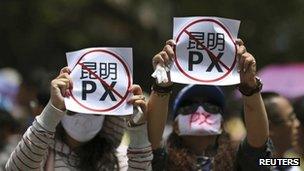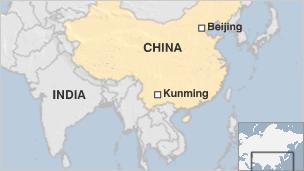Fresh protests in China's Kunming over chemical plant plan
- Published

Protesters fear the refinery will pollute their environment
Protesters have taken to the streets of Kunming in China for the second time this month over plans for a refinery.
The government says the plant, set to produce gasoline and petrochemicals including paraxylene, or PX, is essential to the local economy and will meet environmental standards.
But protesters fear it will end up polluting air and water.
Photos on weibo, China's version of Twitter, show people wearing masks and waving banners amid tight security.
The China National Petroleum Corporation plans to build the refinery in the nearby town of Anning. It would produce gasoline, diesel and fertilisers as well as PX.

But not all are in favour of the plan, with some residents asking for the project's environmental review to be made public.
"The refinery is too close to Kunming," a protester was quoted by the South China Morning Post newspaper, external as saying. "We don't want the refinery."
Reports said several hundred protesters were involved. An estimate by the Associated Press news agency put the number at about 2,000.
On 4 May, hundreds of people also protested against the plant, with some carrying posters warning against the dangers of a PX spill.
A petition has also been posted on the White House website, external asking the US government to "remonstrate with [the] Chinese government" over the refinery. To date it has over 14,000 signatories.
The petitioners said they feared the plant would "jeopardise human health" because reliable "scientific assessments" had not been made, and PX was potentially carcinogenic.
Two years ago, protests against a PX factory in the city of Dalian forced the city government to close the plant, though it reportedly re-opened later.
China's rapid industrialisation has brought serious environmental concerns - but in recent years public protests have forced some projects to be reconsidered.
- Published8 May 2013
- Published4 May 2013
- Published23 October 2012
- Published27 October 2012
- Published3 July 2012
- Published14 August 2011